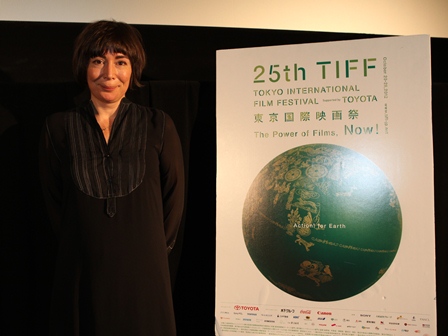10/25 (Thu) Q&A Session of Trashed –natural TIFF supported by TOYOTA film was held with Tabitha Troughton(Associate Producer)

What a scary film. Jeremy Irons appears in the film and played the role of the Executive Producer. Although a documentary, it reminds me of a detective film about trash starring Jeremy Irons.
Tabitha Troughton: I think it’s an urgent film but it has moments of humor; it certainly did even on such a subject.
How was this film made and in what ways did Jeremy become involved?
Troughton: Yes, he has always been passionate about resources, about wastes and about the planet and nature. And it was a project that he really wanted to do from the start. I think he was incredibly brave to do it. I’m really glad that he did because, as he say, it is sometimes a scary film for people and I think that having Jeremy Irons hold your hands through it is a very important thing for people.
As a Producer, I assume you’ve encountered people who were not always cooperative in making the film. Did it make the filming easier with Jeremy in the film?
Troughton: I think Jeremy has a brilliant way of bringing people’s truth out because he is a truthful person and a warm person and that helps. I think all due respect to him, lot of people were almost desperate to tell their stories and this is why it is an investigative film. Because they are stories that people don’t often want to hear but need to.
There are dangerous environmental issues such as landfill that must have been difficult to film. In what ways was it difficult?
Troughton: The firms don’t like their landfills filmed. We were quite careful about filming without permission because obviously in the UK you need permission if you are not on the public land. But we can still film; we still have that liberty to film, if we are standing on the public land. Therefore, all the footages you see in the UK were very carefully filmed. We were filming from public land but filming private property.
Q: What kind of resistance did you have in the film making process in terms of access to certain stories or in your distribution of the film?
Troughton: As to the film making, as a journalist, I’m sorry to say that although these stories were extremely powerful, they are very representative stories and I’ve heard similar stories from around the world. And I don’t think there’s any resistance to people wanting, as I have said earlier, wanting those stories to be told. There was a noticeable lack of response to requests for interviews from the companies, but that is OK; those perspectives are given in all the documents from the UK Health Organizations. I don’t think there is any resistance. I think basically it is time for this film and people want this film and know that it is time for this film. Even from the companies and manufacturers are still equally involved in this problem because they all share the planet. As the resistance to the distributions, we are right at the start and we are having amazing responses from around the world; the film is getting its first theatrical release in New York in December and things are going from there. So I think, strangely for such a potentially controversial topic, things crossed and it seemed to be a right time for it.

Q: Being in country with most numbers of incinerators, what is the message that you want to give to the Japan? Are you going to present the film all around the country?
Troughton: We are looking at what’s going to happen to the film here, I think in the sense the film itself is its own message. It would be pretty cheeky of me to come and try to tell the people of Japan anything. One thing that I increasingly am aware of which I am talking about dioxins from the incinerations; which by no means the only cause of the dioxins. No incinerator in the world is monitored continuously for dioxin emissions. UK incinerators are monitored perhaps twice a year for couple of hours a time. Now I question why.
Q: Although people are making efforts to eco-packaging every product that you see in the supermarket is made of plastic packages and most garbage that come out is basically plastics and chemicals from detergents. I think our parent’s generations were more ecologically minded. I believe that the film shows us how desperate of a situation we are in and I do hope that this film is released in Japan not only at this festival.
Troughton: That is an amazing comment and it shows that what is happening in Japan is exactly as same as what is happening in UK or France and it is a global thing. I think this is an exciting thing about this film, it is that it’s not just you having to trying to work very hard; you are trying very hard already. These are powerful voices that are now coming in. Saying yes, what we were actually doing hundred years ago was infinitely more sensible and allowed our children and grandchildren a chance of a healthy future. What we are doing now is dangerous potentially lethal and we need to change it. European Commissioner, Czechoslovakian man, has recently called on the plastics industry to change their ways. He has basically said that if we keep on going down this road, we are going to hit the brick wall. And you will have to change. The scientist in this film has called for all plastics to be recyclable, which crazy amount or not, and he has called for all products to be designed for the end of their life to be taken into consideration and for this whole process to be reexamined. We did have it very right, in very many ways; but we’ve just gone off course and we need to go back in course. Yeah, OK, it’s individual, but it goes up to national and international level.
Whenever he goes to the supermarket to gets plastic bags, the music of the Vangelis still rings in his head, so I become scared.
Troughton: I am sorry to hear that but I am glad to. I think the main message of the film is not just recycle, reused or rest of it but bring it down to the zero waste. San Francisco, 75% but heading towards zero waste; lots of places around the world are actually just stopping producing this much waste in the first place, this is what we must do. It’s very easy to be sold the plastic bag that people tell you that is recyclable but isn’t. It’s very easy for industry to come up with what is the solution and then they turn out not to be.
Trashed



















